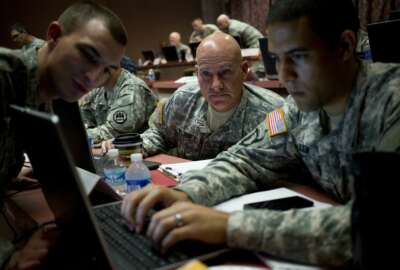
Faster unified capabilities and open source code on DISA’s plate for 2017
DISA is trying to speed up its acquisition of collaborative video, voice and data services.
The Defense Information Systems Agency is trying to speed up the delivery of its voice, video and data services to Defense Department and military employees.
DISA currently has its Unified Capabilities (UC) contract award date set for the fourth quarter of 2018, but the IT agency thinks it can push the award to the left and have it finished by the first quarter. The contract, called Defense Enterprise Office Solutions (DEOS), would integrate things like voice, video, email, content management and other communication devices into one seamless, unified client.
However, DISA’s Enterprise-wide Services Division Chief Brian Hermann thinks DISA can award and set up UC faster.
“Right now my focus is getting to the contract award phase as quickly and safely and smartly as we can. We do think that we can make some progress to getting it to the first quarter of [Fiscal] 2018 as an award. There’s some things that we have to do there, including socializing the acquisition strategy with the leadership and at the Pentagon,” Hermann told reporters during a Nov. 17 roundtable in Baltimore.
Hermann said there is an expectation that DEOS would work like Defense Enterprise Email in that it’s something the military services would subscribe to on their own.
“We would have a business case that shows what it looks like as a service provider, what DISA will pay to provide those services and then we will also have our own business case that shows what DISA pays to consume those services and then that will be a model that each of the services or agencies can use on their own to say, ‘I can make that choice because it makes sense to me. I get additional capabilities at the same cost or I save money in doing this and save money in some business areas I don’t want to be in,’” Hermann said.
DISA worked with other countries and private companies to see how quickly after an award the services could be up and working. While in the past it took a year before services were available to customers, Hermann said he thinks with industry’s help DISA can set up some of the services in six to nine months.
DEOS “is our next big contracting effort to take how we do collaboration, email, basic office productivity type services. How do we do that in the way industry does today,” said Capt. Al Holtslander, DISA director of services development.
Hermann said DEOS is the next big evolution for UC, but it will not be the final iteration.
Right now the military uses individual stove-piped systems for each service like voice and video.
Holtslander said DISA will continue to maintain the legacy systems until it can get UC. DISA does not yet have an acquisition strategy for DEOS.
Open Source
The newest fad within the Defense Department is the use of bug bounty programs to find vulnerabilities in defense networks.
Lisa Wisewell, digital security lead for the Defense Digital Service, told Federal News Radio Nov. 16 that DoD will increase its use of bug bounty programs by the end of the year.
DoD already awarded $7 million in contracts to fund future programs.
DISA is also joining in on the fun and is considering making some of its source code public so coders can help improve it.
“Something you’ll be seeing increasing as we move on. We’ll be releasing our products in a draft form before we go out for an actual procurement. … Another thing you are going to see more of is the idea of a bug bounty or even publishing our source code, making it public, putting it out there for industry’s comments, for white-hat hackers to come back at us and tell us, ‘You’ve got a problem here,’” said DISA Vice Director Maj. Gen. Sarah Zabel.
Alfred Rivera, DISA’s director of development and business management, said opening up source code can be used as a tool evaluating deficiencies in the code.
“We’re looking at some of our current large development efforts like command and control as the next generation … as one of those opportunities,” Rivera said.
Copyright © 2025 Federal News Network. All rights reserved. This website is not intended for users located within the European Economic Area.
Scott Maucione is a defense reporter for Federal News Network and reports on human capital, workforce and the Defense Department at-large.
Follow @smaucioneWFED
Related Stories




